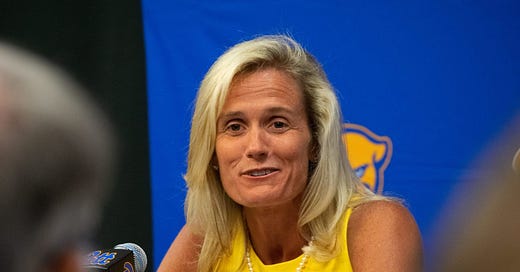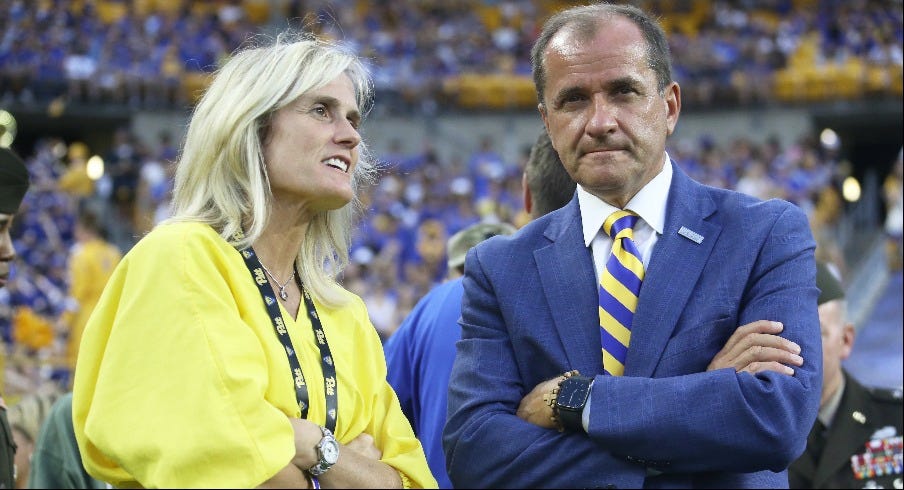Heather Lyke flew too close to the sun
Pitt's award-winning athletic director was fired earlier this week after a seemingly decorated seven-year tenure. If the move was a surprise, perhaps it shouldn't have been
A quick note: This story references reporting from the Pittsburgh Post-Gazette, my former employer of 10 years. The newspaper is currently violating federal labor law by refusing to bargain in good faith with its union, which has been working without a contract since 2017. In solidarity with the dozens of staff members nearing two full years on strike, there will be no links to the Post-Gazette in this newsletter.
You can donate to a fund that directly assists the striking workers and their families here.
At 2:56 p.m. on Monday, the Pitt volleyball program came forward with an exciting bit of news. For the first time in their history, the Panthers were the No. 1 team in the country, the latest step in a remarkable rise for a program that made the NCAA Tournament just twice between 1995-2015.
Almost exactly five hours earlier, the university released a different type of announcement – Heather Lyke, the school’s athletic director who played at least some role in Pitt volleyball making the national semifinals in each of the past three seasons, had been fired.
The contrast was impossible to ignore. A once-lagging athletic department that had enjoyed its most prolonged, well-rounded run of success had just willingly let go of the person who had overseen and fostered it, someone who just days earlier had been publicly linked to an AD vacancy at a school in the largest, wealthiest conference in college athletics.
Leading an athletic department that employs hundreds of people and brought in nearly $140 million in revenue is an often misunderstood job. But going off the standard by which the average fan judges an AD – how well are the teams at the school doing? – Lyke was a largely unquestionable success over her seven-plus years.
Many of the Panthers’ teams had enjoyed a competitive renaissance simultaneously.
Pitt’s proud football program, with nine claimed national championships to its name, broke out of an extended malaise to win its first-ever ACC championship in 2021 and earn top-25 finishes in consecutive seasons for the first time since 1982-83. The volleyball program reached its aforementioned and once-unimaginable heights. The men’s soccer program, which went 4-40-7 in conference play in its first six seasons in the ACC, has been to the College Cup (college soccer’s Final Four) in two of the past four seasons. The women’s soccer program, which had previously never made it to the NCAA Tournament, has now qualified for the postseason in back-to-back seasons, including a run to the national quarterfinals last year. Led by a coach Lyke hired, Pitt wrestler Nino Bonaccorsi won a national championship in 2023.
Financially, the department seemed to be excelling, as well, with a record $40 million raised during the 2021-22 fiscal year, a mark inflated significantly by a $20 million donation from alum Chris Bickell that stands as the largest contribution in the department’s history.
It was all good until it wasn’t.
The relentless pursuit of comprehensive excellence
There’s a story Lyke often told, one that served as the opening anecdote in virtually any profile ever written about her.
Shortly after she arrived at Pitt in 2017, she asked where the school’s ACC championship trophies were. To that point, the Panthers had only won one – their wrestling team nabbed a conference title in 2014 – which Lyke found in the basement of Fitzgerald Field House, the school’s musty, then-66-year-old arena that housed nearly all of the university’s non-revenue sports.
For years, a perennial top-10 men’s basketball program and a football program that churned out future Pro Bowlers masked the broader failings of an athletic department that struggled in virtually every other sport. In the 10 years before Lyke’s hiring, the Panthers never finished higher than 85th in the standings for the Learfield Directors’ Cup, given annually to the top-performing athletic department in college athletics. Even in the year they reached that high-water mark, it still ended up one spot behind esteemed athletic powerhouse Arkansas State.
“There was apathy,” Lyke said to Sports Illustrated in a 2023 piece highlighting her work. “People were comfortable.”
From the moment she got to Pitt, whether it in a prepared statement, a press conference or an interview, Lyke routinely referenced the goal of “comprehensive excellence,” a standard by which her department and its teams appeared to abide. And for that, she was beloved by a passionate fan base that had grown accustomed to ineffectual or incompetent athletic leadership.
At least part of her appeal came from doing things that seemed obvious but were for years presented as Herculean tasks that simply couldn’t be accomplished.
She changed the Panthers’ color scheme from navy blue and gold to blue and yellow, a long-awaited move for an aesthetically minded fan base. She fired men’s basketball coach Kevin Stallings, who was hired by her predecessor, two seasons into a predictably disastrous tenure and took some cutthroat steps to reduce his buyout by about half. If a coach was having success and had their program trending in an palpably positive direction, she’d ink them to an extension. She reconfigured the broadcast setup at the school’s basketball arena so that Pitt’s raucous student section, the Oakland Zoo, appeared on television during games instead of the courtside suites housing the school’s donors.
During an election year, it’s not a stretch to say she operated like a politician might. She pursued popular moves and, unlike a lot of our elected leaders, acted on them. Like her commonwealth’s governor is fond of saying, she got shit done.
For her, there were benefits of occupying that lofty perch.
Keep reading with a 7-day free trial
Subscribe to The Front Porch to keep reading this post and get 7 days of free access to the full post archives.





